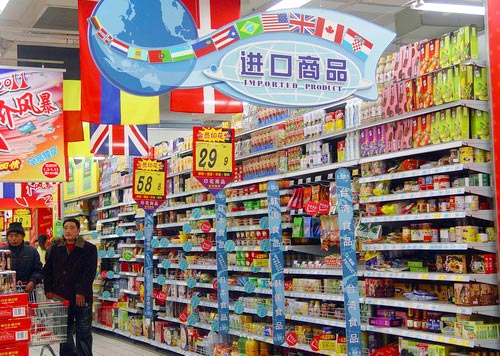China will work harder to bring in more imports as it strives to bring balance to its trade, according to guidelines issued by the State Council on Monday.
"The government will further improve the structure of imports and stabilize imports of bulk commodities while importing more advanced technological equipment, important parts and raw materials and appropriately broadening its imports of consumer goods," according to the guidelines.
"More money for import promotion will be added to the present money set aside for developing foreign trade. And interest subsidies will be provided for government-encouraged imports while the coverage of the interest subsidies will be appropriately adjusted."
The guidelines also called for more support for imports from developing economies.
|
 Shoppers at the imported products section of a supermarket in Huaibei, Anhui province. [Photo/China Daily]? |
Dong Dengxin, head of the securities research institute at Wuhan University of Science and Technology, said the guidelines come as an important sign amid China's economic transition.
"The policy will help balance China's international trade in view of its great foreign exchange reserves and ease the rising price at home against the background of a high (consumer price index)," he said. "The measures will also drive down the prices of imports and give the Chinese a greater chance of enjoying imported commodities as the yuan appreciates."
The duties charged on some imports will also be adjusted. Tentative tax rates will be introduced to lower the import duties charged on some raw materials and commodities used in people's everyday lives, as well as to adjust the duties charged on imports of some advanced equipment and components.
The goal will be to reduce the duties charged on primary raw materials and important components that are used in strategic emerging industries but that cannot be produced by China, the document said.
"The important result of expanding imports of consumer commodities and other things is to bring more competition to domestic markets and provide more high-quality products for consumers," said Wang Haifeng, director of international economics at the Institute for International Economic Research, a think tank under the National Development and Reform Commission.
Easier means of obtaining financing are being called for to encourage imports of advanced products and resources, as well as to broaden importers' means of obtaining finance.
China reported the value of its imports increased by 6.8 percent in the first quarter of the year, down 26 percent year-on-year. It also said the value of its exports increased by 7.6 percent in the same period. That was the slowest rise seen since 1999 except for in 2009, when the figures were distorted by the world financial crisis, according to the Spring 2012 Report on the Foreign Trade Situation of China, which was issued by the Ministry of Commerce on Friday.
Sluggish overseas demand and increasing domestic costs have taken a deceleration seen in China's foreign trade in the fourth quarter of 2011 and extended it to the first quarter of 2012. The second quarter, meanwhile, will continue to see slow trade growth while the whole year is expected to see slower but more balanced trade growth than 2011, according to the report.
"The slowdown in GDP growth is under control and expanding imports will not hurt GDP growth, which the government wants to see happen at a rate of 7.5 percent this year," Wang said. "That will drive the economic transition at home and lead to balanced trade."
For the country's 12th Five-Year Plan (2011-15), the ministry has set a goal of having trade grow at an average rate of 10 percent a year. That's lower than the 15.9 percent in average annual trade growth seen during the 11th Five-Year Plan (2006-10).
The lower target came in response, in part, to the global economic slowdown, trade protectionism, fluctuations in exchange rates and increasing costs, according to the 12th Five-Year Foreign Trade Guide issued on Thursday.
"China's move to expand imports will bring more market room for economies troubled by economic crises and reduce trade frictions," Wang said. "What's more important, it signals China's economic growth will continue and promote confidence in a global economic recovery."
